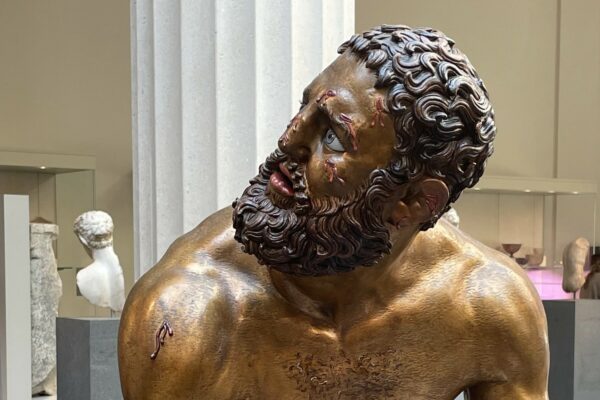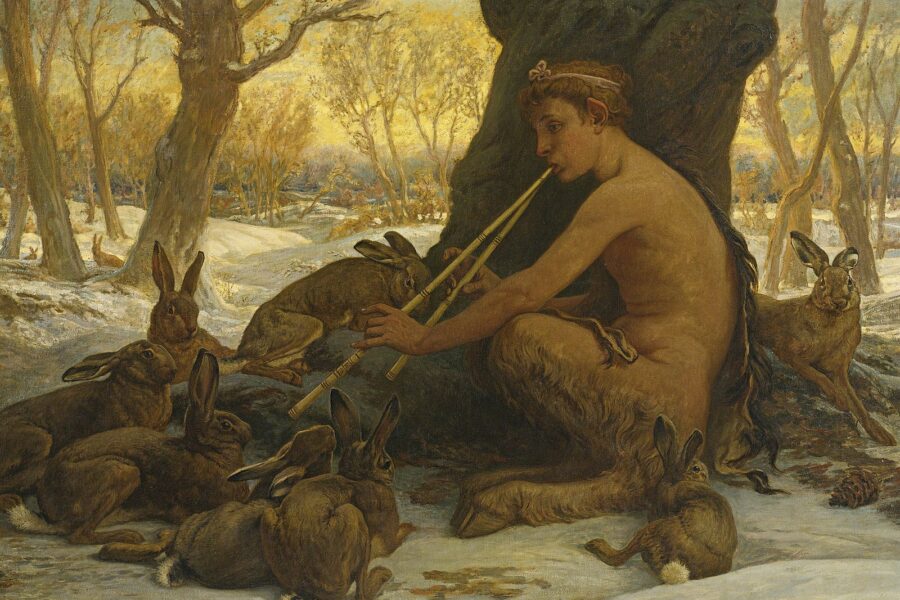
The Velveteen Rabbit said “No children’s story can traumatize like I can!” And Greek Mythology said “Hold my wine.”
Meeting 10: In which Homer tells a tale of Marsyas, music, and Midas to the Muses, and Calliope learns about basketball.
This episode of Mythology Pitch Meetings brought to you by CLAS-C 205 Classical Mythology.
Have you ever wondered how your favorite Classical Myths came to be? This is absolutely not how that happened, but it could have happened, maybe, and that’s the point of mythology. Shout-out to Ryan George, whose Pitch Meeting video series inspired the Muses.
CALLIOPE, MUSE OF EPIC POETRY: So you have a Classical Myth to pitch to me?
HOMER, UNCONTESTED G.O.A.T OF ANCIENT POETRY: Do I! I decided to back off the big-picture, cosmological questions for awhile. Those tend to get weird really quick, for some reason.
CALLIOPE: I still think questions like “where did the universe come from” aren’t that interesting. I can’t imagine anyone will ever really care.
CLIO, MUSE OF HISTORY (interrupting): Actually, many, dare I say most cultures will be very interested in those exact sort of issues. European culture in particular will be really into it. There will be this huge debate in 1920s America where they put a monkey on trial about the issue. Although honestly I just skimmed that last one, I may be confusing the details. I have to admit, being Greek myself, I do have a hard time caring about this issue. All of Ancient Greece and Rome will essentially ignore it.
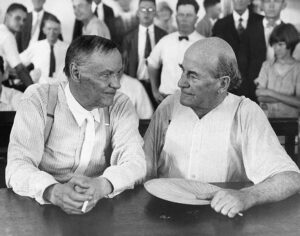
Clarence Darrow (left), a famous Chicago lawyer, informs William Jennings Bryan (right), defender of Fundamentalism, that he’s got $50 riding on the monkey.
HOMER: For this myth, I thought I’d go light and focus on music.
CALLIOPE: Sounds delightful. I love music. That’s why I set all Greek poetry to music.
CLIO: People will completely forget that.
CALLIOPE: Zip it, Sis.
HOMER: So, Athena, Goddess of Expertise and Craftsmanship, has invented a musical instrument called the aulos. And she’s very pleased with it, until one day while she’s playing it, she catches sight of her reflection and realizes playing it makes her look ridiculously ugly. So she throws it away, and curses whoever finds it to a terrible death!
CALLIOPE: Wait, what sort of instrument is this that the mere sight of her playing it would cause this reaction?
CLIO: It’s a double-reed instrument, where two long pipes extend directly from the musician’s mouth and are played simultaneously through circular breathing. Sort of like a bagpipe, but the musician is the bag.
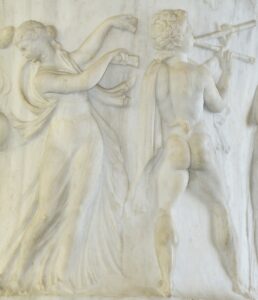
The risqué cover of Apollo’s album “Aw Yeah Aulos” infamously led to its blackballing at retailers such as Target.
CALLIOPE: Wow, that sounds extraordinarily difficult to even keep in place.
CLIO: Actually, that aspect is super easy, barely an inconvenience. The musician wears a device called a phrobeia, which is essentially a series of straps that wrap around the head and hold the device steady, while easing the strain on the lips.
HOMER: But the musician’s cheeks will still puff out like a pig! Hilarious, amiright?
CALLIOPE: Wait, so you’re saying Athena, goddess of expertise and craftsmanship, will be surprised to learn that a device she invented, where you use extensive head-straps to position large wind-tubes sticking out of your throat, makes her look unattractive.
HOMER: Specifically surprised by the cheeks part, yes.
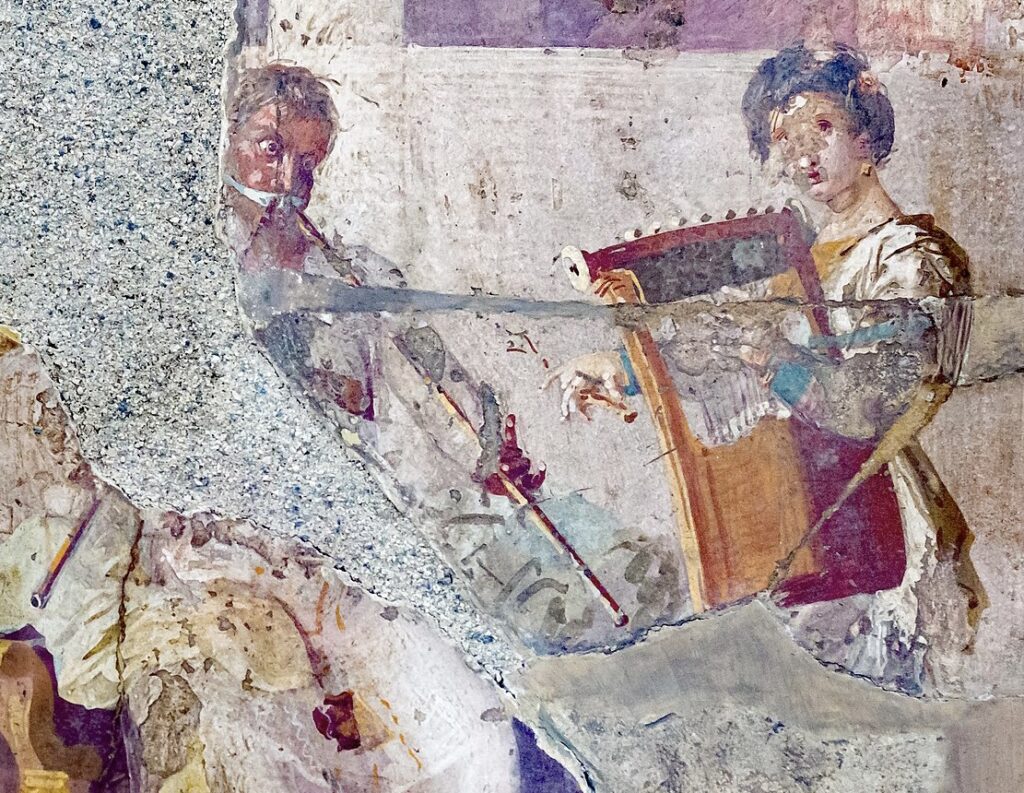
Presented without comment.
CALLIOPE: What is with you and myths that insist Athena is so obsessed with her appearance? Look at how the goddess dresses! That is not what you put on in the morning if you want to attract romantic attention. This seems deeply misogynistic somehow, although honestly it’s also just confusing.
HOMER: Look, in this case it’s all just setup and foreshadowing. Greek goddesses mostly go around smashing things, but I needed one who would believably construct something first. Before throwing it away in an attempt to smash it. The main character here is actually this satyr Marsyas, who finds the aulos and becomes so good at playing it, he eventually decides to challenge Apollo, the god of music, to a music contest. Apollo immediately accepts the challenge, and its on!
CALLIOPE: Why would Apollo, an Olympian god, bother to prove himself to a horny goat-man in the woods?
HOMER: I’ve decided if there’s one thing the Greek gods cannot abide, it’s someone stepping to them. Rape, murder, incest, pillaging—they’ll ignore or even encourage pretty much any mortal behavior, so long as you don’t try to get more likes than them. So, the contest gets going, and its neck and neck, Marysas blowing on his aulos, Apollo strumming his lyre. Marsyas plays one string of notes, and then Apollo will have to play it. And then Apollo plays something, and Marsyas will have to match it. And so on, with each musician trying to challenge the other with an unmatchable skill.
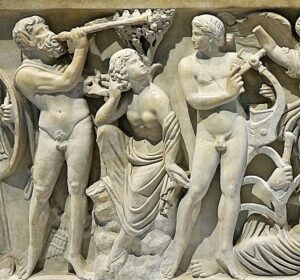
I don’t know who the “bored band girlfriend caught in yet another jam session” figure is supposed to be, but I love that she’s there.
CLIO: Like a game of HORSE.
CALLIOPE: How is this anything like a horse?
CLIO: Never mind.
HOMER: Finally, Apollo turns his lyre upside down and plays a little tune. But you can’t play an aulos upside down, so Apollo wins!
CALLIOPE: I have so many questions. First of all, why would playing an instrument upside down be desirable or even within the rules? Second of all, why would the god of music need a trick-play to win a competition in music? Third of all, how is any of this like a horse?
HOMER: I have answers to none of those questions. The point is, because Apollo won the music contest, he gets to do whatever he wants with Marsyas. So he has him flayed alive, as a lesson against being so prideful that you challenge the gods.
CALLIOPE: Wow, that escalated quickly. Won’t that gruesome of an ending limit the story’s appeal? Also, is it because you can’t turn a horse upside down and still use it?
CLIO: Actually, this story will prove immensely popular, especially in the visual arts. Roman elites in particular will love decorating their gardens with massive statues of Marsyas hanging from a tree, waiting to be skinned like an animal.
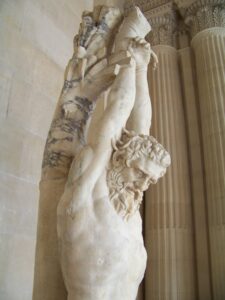
Ancient Roman garden gnome, 2nd c. CE
HOMER: Man, Romans are intense.
CALLIOPE: Will mortals develop a contest involving horses and music? Like teaching a horse to dance? That sounds ridiculous even as I say it.
CLIO: Yes, they will, and they’ll call it dressage, but that’s not actually what I was talking about. I was talking about a game where contestants competitively demonstrate their skills in throwing a ball through a hoop.
CALLIOPE: How is THAT anything like a horse?
CLIO: Calliope is actually right, the gorier part of this story is great, but it would be better if we could have something in there that more modern mortals will find appealing for children. Something silly and more harmless. With funny sounds.
HOMER: Um, ok…oh I know! How about there’s a mortal judge. King Midas. And he thinks Marsyas’ playing is actually better, so Apollo curses Midas with the ears of an ass.
CALLIOPE: Why would there be any scenario where the god of music could take second place at music? Although the ears thing is somewhat like a horse.
CLIO: Also how is this child friendly? Pinocchio aside, of course.

As if this didn’t haunt your childhood enough, now you know the mythological background.
HOMER: Um…Midas can try to keep his condition a secret by wearing a funny hat. And the only person who will know the truth is Midas’ barber, who one day will try to relieve the strain of his secret by whispering “King Midas has ass ears” to the grass. And that will be why grass makes a shushing noise when the wind blows!
CLIO: That is the dumbest story I’ve ever heard.
HOMER: I thought it was pretty clever! It keeps the reed-sound thing going from the main storyline. That’s what I was playing with, anyway. Hey, music pun!
CALLIOPE: Well, I’ve heard enough to green light. I want to wrap this up so I can go ask Poseidon if maybe he understands what all this horse nonsense is about. He got to be the god of horses, as well as the sea, because mortals thought breaking waves looked like charging horses. Maybe he’ll have some insight into why mortals are so confused as to what is, or is not, a horse.
HOMER: While we’re on the subject, I’ve got a sequel to the Judgment of Paris where Athena builds a wooden horse! And then uses it to smash things.
CALLIOPE: Of course you do.
Share on Twitter, or Instagram, or really wherever you want.
For more stories about why challenging the gods to various contests never ends well, and what that can tell us about Ancient Greek and modern societies, enroll in CLAS-C 205 Classical Mythology, coming up Spring 2023, and earn GEC credits while you’re at it! Can’t get enough of Ancient Greece and Rome? Earn a Classics Minor in just 15 credits!


